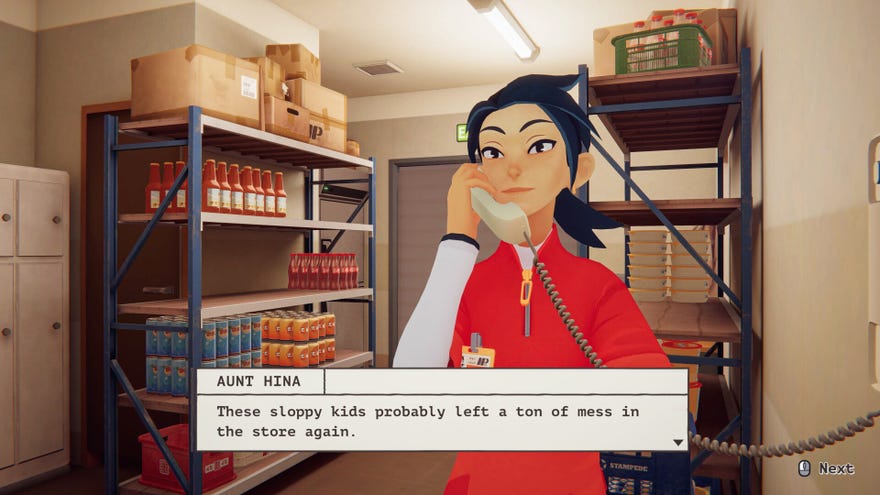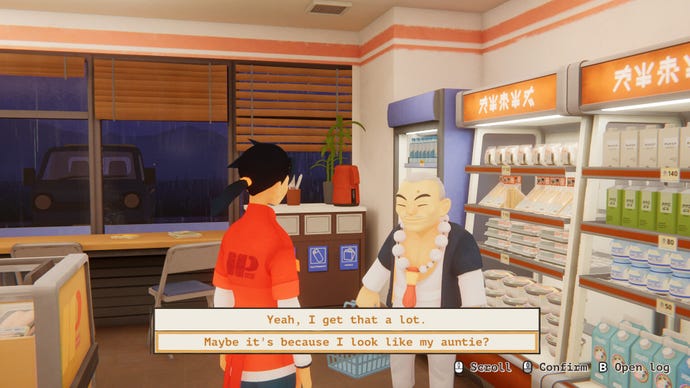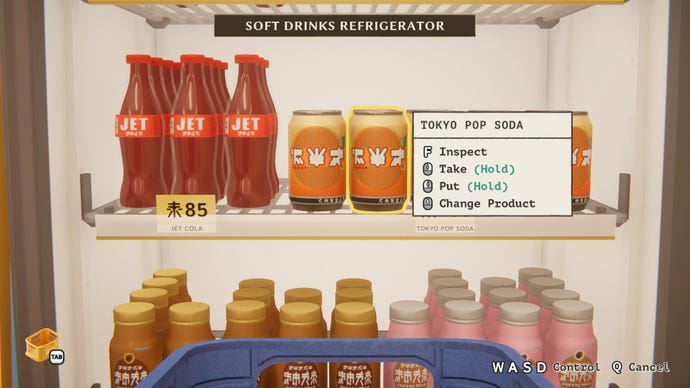HomeFeaturesinKONBINI: One Store. Many Stories
InKonbini is Shenmue, but just the convenience storeTomato, tomato
Tomato, tomato
Image credit:Nagai Industries
Image credit:Nagai Industries

Tucked away in a corner of 1999’s Yosuka, Japan-setopen worldsimShenmuethere’s a convenience store, or “konbini”, where you can buy stuff like carrot juice, take part in raffles, and fritter away the hours listening tothe shop jingle- an absolute die-cast classic of the genre in that you’ll probably be humming the tune before you realise that you’ve even heard it. Nagai Industries founder Dima Shen has been obsessed with that unassuming Tomato Convenience Store since he was a teenager, partly for the contrast it offers to the rest of the game. “Shenmue was a really depressing game, I would say - your father is killed, it’s always raining,” he tells me. “But there’s one kind of super-healthy place in the whole game: a convenience store!”
Sega and Yu Suzuki’s behemothic creation has guided Shen’s career as a developer himself. He createda Shenmue fangamea decade ago, roundabouts the launch ofShenmue 3’s Kickstarter. In particular, he’s spent years trying to devise something that stirs up the same emotions as the Tomato Convenience Store - a “relaxing game about some simple job”. At one point, he and the Nagai Industries team - eight people from around the world, with Shen based in Tokyo - discussed creating a supermarket sim. “And then I realised that we could actually do a Japanese store. I was like ‘wow’, I got chills all over my body.” The resulting InKonbini: One Store Many Stories -Steam page here- is a game of cosy busywork and branching conversations that is both immediately charming and an absolutely shameless daydream.
inKONBINI: One Store. Many Stories | Official Announcement TeaserWatch on YouTube
inKONBINI: One Store. Many Stories | Official Announcement Teaser

I was going to call InKonbini “pure calcified nostalgia”, but in this case, it’s nostalgia for a representation, the image of a konbini preserved in a decades-old videogame. I find this eerie. There are also some familiar broader questions to ask about the ethics or, at least, cringeiness of romanticising roles that tend to be underpaid and precarious. I’ve never been to Japan or set foot in a konbini, but I’ve worked in various supermarkets, newsagents and department stores, and while I enjoyed aspects of the job and made good friends in the process, the idea of, say, a Japanese developer releasing a game called Tesco Janitor: Shifts Of The Heart makes me crinkle at the edges.
Image credit:Nagai Industries


Shen seems both thoroughly aware that he is weaving a fairytale and entirely lost in that fairytale. He describes himself and his team as “otakus” - that is, as people who identify as consumers of fantasies. His idealisation of Japan seems to have persisted during his years in Tokyo, shopping at convenience stores more or less every day, and becoming more familiar with the realities of the sector and the lives of its workers. I’m speculating, but I don’t get the impression that this experience will enter much into the writing of the game. InKonbini is set where and when it is partly in order to sustain the escapism, with an undertone of reactionary thinking. The absence of modern smartphones means that Makoto has more opportunity to chat and get to know customers, for example, and Shen suggests that people are more “open-hearted” in the countryside than in the city.
Naturally, shopping in konbinis as an adult has helped with development of InKonbini, but Shen’s enthusiasm for the subject matter has occasionally gotten him into hot water. “One time I even tried to get a job there. I was invited for the interview,” he says. “And they were asking me questions, and it was like, okay, everything’s cool. And they said wait here until we return. And I was in the back office and I was like, ah, I can finally collect references for the game, and I started taking pictures. And they noticed me and were like, ‘you’re kind of a weird guy - please leave’.”
The encounter supplied evidence that working at a konbini isn’t exactly a dream career within Japan. The store owners found Shen baffling. “I was this kind of weird gaijin, because I’m here for research and fun rather than working hard,” he says. “Because usually, they look for immigrants who were really eager for money, and they asked me why I want to work here, and I said ‘because I love konbini’. And it was like ‘what? Why do you love a low-paid job that’s no fun?'”